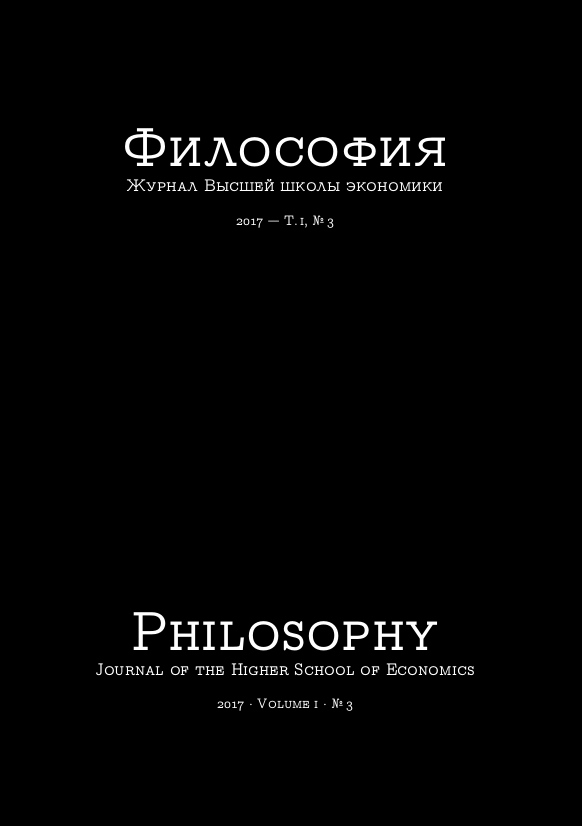Models of Being and Frames of Knowledge
Abstract
The third issue of our Journal opens a new block of subjects and studies, this time regarding epistemology, ontology, and the philosophy of science. The range of materials may seem pretty colorful, but as the authors strongly believe, upon closer examination the reader will be able to see certain internal coherence and meaningful interchanges in these materials.
In particular, the block related to epistemological and ontological issues is of great interest.
The article of A. Shiyan deals with understanding of Husserl's phenomenology, which deviates from the main lines of interpretation of his philosophical system of views. Herewith the author refuses to divide Husserl's thoughts into periods (as it is normally done by researchers) and highlights the ontological and methodological principles of Husserl's phenomenological approach, which seem to be the most promising principles for today's philosophy. The author tries to minimize the text from the point of specific phenomenological terminology and to discuss the informative aspects of the philosophical language. Particular attention is paid to the topical issues of phenomenology and the possibilities for their different interpretations.
The article of T. Shiyan, which attempts to reveal the ontological status of mathematics and science objects, is rather innovative. The article refers to the fact that the meaning of the operation, consisting in the reference to the type of objects still has eluded logical and philosophical reflection and methodological theming. The author considers the years of controversy about the nature and genesis of philosophy, mathematics and science in general, and highlights four basic ontological interpretations of philosophy and science: as a knowledge, as a pool or system of knowledge, a type of certain activity and as a field of expertise or as a social institution.
In the same block we should also refer to the article of V. Kuznetsov, in which the famous ‘rule-following’ paradox formulated by Wittgenstein, receives interesting interpretations from the point of cultural context. For a productive and constructive discussion of the “rule-following” paradox in its various aspects, the author proposes to take advantage of the social relay concept offered by M. A. Rozov.
The article of A. Maltsev continues the study, first presented in the second issue, related to the problem of subjectness in Russia in the 18th century. Based on example of Andrei Bolotov the attempt to identify the possibility of crystallization of the human inner world, the formation of his sameness is made. It shows the way how through the internal mythology, a story about himself the core of “selfhood” is thought out and thus constituted as a creative act of invention and, in fact, self-creation. The reader is now offered to deal with the second part of this study.
No less curious is the block devoted to the subject of negativity. Here two papers are published. The article of A. Markov describes how the Greek philosophers of the scientific revolution era, bearing in mind the great heritage and striving to be competitive in the global marketplace of ideas, have radically changed both Platonism and Aristoteliasm. Although this philosophical project might be inspired by various sources, from apophatic theology to the second scholasticism, this study shows that it is completely self-sufficient and is fully based on the reinterpretation of logic and epistemology. The logic turns from the art of working with the idea into the characteristic of thought and the act of thinking is implemented as a negative epistemology.
The subject of negativity is continued by review made by D. Shalaginov, whose text analyses Andrew Culp's work called “Dark Deleuze”, which is the experience of the «negative» reading of the French philosopher's heritage. At present this «anti-connectivist manifesto» is one of the few attempts of radical revision of Deleuze thoughts. Definitely important act of Culp, focused on the gap with the so-called “canon of joy”, is faced with difficulties that have been highlighted in the review.
Another wonderful review, prepared by A. Tsygurov is made to the book “Kant's Modal Metaphysics” by Nicholas F. Stang, which introduces the reader to the fruits of many years of work, the results of which are impressive: in addition to the fact that the monograph is the first major study in English devoted entirely to Kant's modal metaphysics, it is accurate in the formulation of questions that need to be addressed to Kant's theoretical philosophy. This review will allow Russian-speaking readers interested in reconstructions of Kant's philosophy using modern philosophical tools, to familiarize themselves with both major themes of the book and the author's methodology.
The same section contains two similar reviews prepared by G. Korayev and N. Dolgorukova, which are dedicated to a nontrivial view of the creative heritage of M. Bakhtin. Both of them are valuable not only from the point of return of a remarkable thinker to the native ground (through the revival of interest in his ideas), but also due to unexpected reversal in the presentation of possible views on his work in the modern humanitaristics in general, and study of Bakhtin thoughts in particular.
A special place in the issue belongs to the translation of Francisco de Vitoria, prepared by S. Porfiriyeva. From it we learn primarily about the magical competence of demons in representation of the right honourable medieval theologians, but also we can learn from this work, information about the state of scientific and magical knowledge of the historical era. We sincerely hope that reading of this issue will be exciting and fun and the reader can find something useful.
Diana Gasparyan
Downloads






